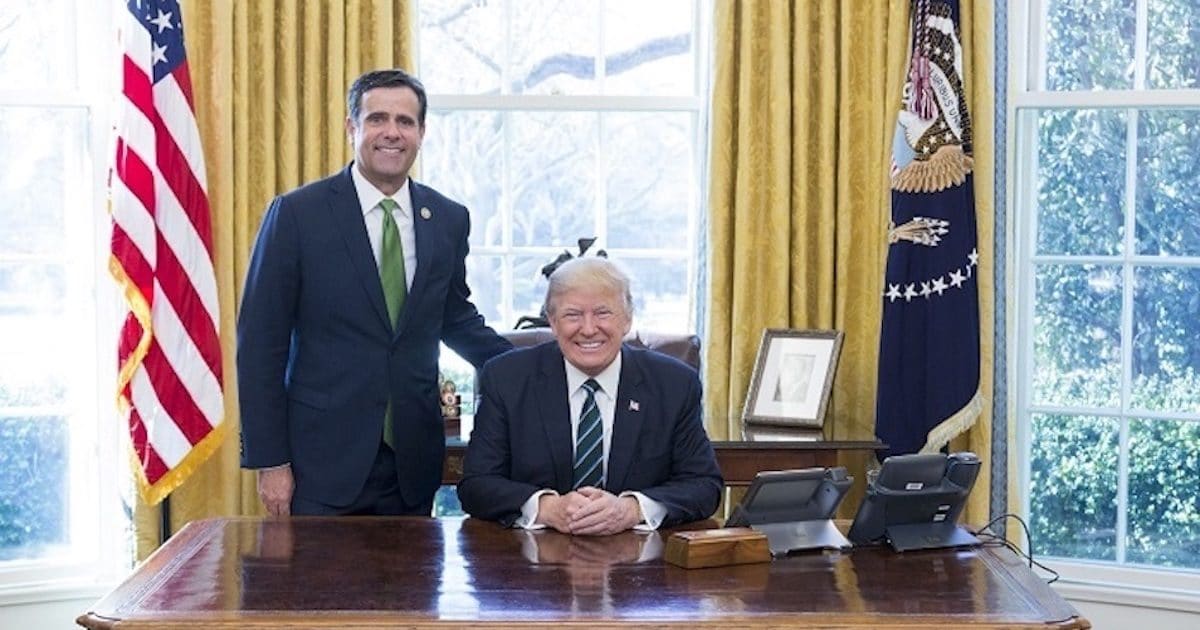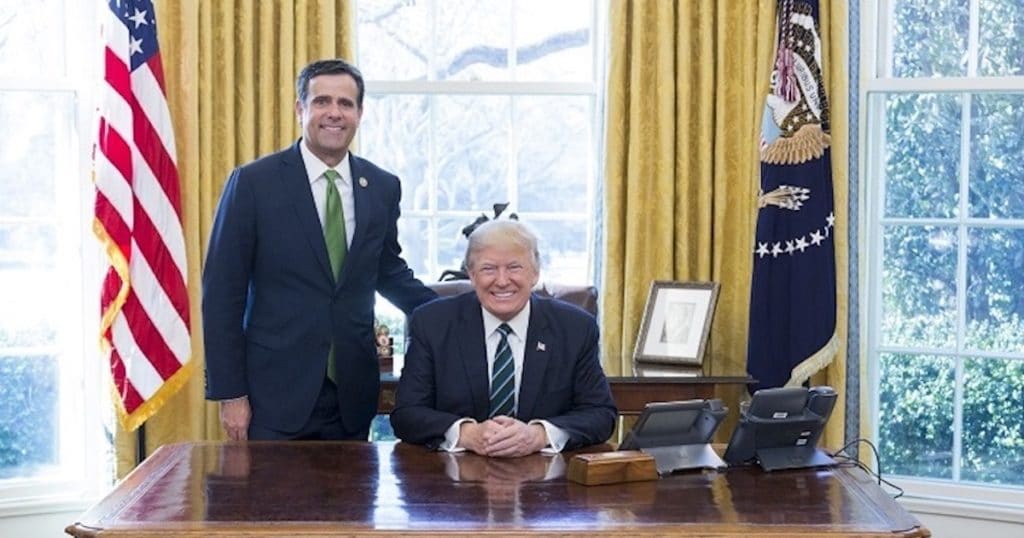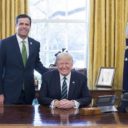
Mitch McConnell Refused to Meet With John Ratcliffe

Rep. John Ratcliffe, R-Tx., on Friday withdrew his name from consideration to replace Dan Coats as the Director of National Intelligence (DNI). The withdrawal came only days after President Donald Trump announced that Director Coats would step down this month.
Director Coats, a former U.S. Senator from Indiana, has held the job since March 2017.
“While I am and will remain very grateful to the President for his intention to nominate me as Director of National Intelligence, I am withdrawing from consideration,” the Ranking Member of the House Subcommittee on Crime, Terrorism and Homeland Security tweeted on Friday.
Critics argued he didn’t have the experience to run the Office of the Director of National Intelligence (ODNI). Senate Minority Leader Chuck Schumer, D-N.Y., said it would be a “big mistake” to confirm him “to a position that requires intelligence expertise and non-partisanship.”
President Trump said on Friday at the White House he thought Rep. Ratcliffe “was being treated very unfairly.”
“He doesn’t deserve it,” the President told reporters. He announced the withdrawal of Rep. Ratcliffe’s name from consideration and his intent to nominate on Twitter.
But according to sources with knowledge of the events, it was Senate Majority Leader Mitch McConnell, R-Ky., and two other Republican Senators who sank the intended nominee before the formal nomination. Further, their reasons appear to be unrelated to his job qualifications.
Sources tell PPD that President Trump, Vice President Mike Pence and acting White House Chief of Staff Mick Mulvaney were willing to fight for what was expected to be a tough nomination battle.
The White House strategy was to allow political opponents to have their attacks following the announcement. They would not hold a press conference or respond until the political storm calmed. Rep. Ratcliff agreed under the condition the majority leader would have his back.
But he didn’t.
Instead, Senate Majority Leader McConnell refused to meet with Rep. Ratcliffe after the announcement, at best putting him off for at least a few weeks.
Senator Richard Burr, R-N.C., the Chairman of the Senate Intelligence Committee who would’ve presided over confirmation hearings, said publicly he would “work to move it swiftly through regular order” after the White House sent the formal nomination.
But privately, he was a “hard no,” according to sources.
“Burr was the big schemer,” one source, who spoke to PPD on the condition of anonymity, said. The scheme was to sabotage Rep. Ratcliffe to force President Trump to nominate ODNI Principal Deputy Director Sue Gordon, who by federal law is next in line to take over as acting DNI.
Senator Mark Warner, D-Va., the Ranking Member of the Senate Intelligence Committee, agrees. He tweeted “the President should take this opportunity to nominate a DNI in the mold of Dan Coats,” an intelligence insider.
“He [Burr] has more in common with Warner than he does with Trump on this and they want a more intelligence community-friendly nominee,” another source added. “Someone more like Coats.”
Mr. Coats served on the Senate Intelligence Committee from 2015 to 2016, which approved his nomination by a vote of 13 to 2 on March 9, 2017.
After the U.S. Senate voted 85 to 12 to confirmed him on March 15, the committee undertook what media and D.C. framed as “the serious investigation” into Russian interference. The comparison aimed to downplay findings from the more skeptical House Intelligence Committee.
While ultimately concluding there was no evidence to support allegations of collusion between members of the Trump Campaign and Russia — the same conclusion reached by the House a year earlier — the committee was not without embarrassment.
James A. Wolfe, the committee’s longtime director of security, pleaded guilty in October 2018 to making false statements to federal agents during the course of an investigation into the unlawful disclosure of classified information.
Put plainly, he selectively leaked classified national security information to The New York Times in a manner designed to politically damage President Trump. The plea deal allowed him to avoid more serious charges involving the leaks.
In May, Attorney General William Barr assigned U.S. Attorney John H. Durham in Connecticut to conduct an investigation in to the origins of and potential wrongdoings in the Russia probe. Director Coats and FBI Director Christopher Wray have been less than cooperative with investigators.
But Rep. Ratcliffe supported the investigation, has long-been skeptical of unfounded allegations of collusion, and likely would’ve been more forthcoming with investigators.
Senator Susan Collins, R-Me., found that skepticism problematic. She was also a “no” specifically because she felt Rep. Ratcliffe was too tough on former Special Counsel Robert Mueller during testimony under oath last month.
Mr. Mueller, the former figurehead of the Investigation into Russian Interference in the 2016 Presidential Election, testified before House Committees on July 31. He appeared confused and contradictory as he faced questions from Republicans on the House Judiciary Committee.
One of the most damning moments for Mr. Mueller and Democrats came during an exchange with Rep. Ratcliffe, who argued the assertion that the investigation didn’t exonerate President Trump violated policy and a “bedrock principle of our justice system.”
Rep. Ratcliffe asked Mr. Mueller to identify a case in which the law “set forth a legal standard that an investigated person is not exonerated if their innocence from criminal conduct is not conclusively determined.”
“Can you give an example other than Donald Trump where the Justice Department determined an investigated person was not exonerated because their innocence was not conclusively determined?” Rep. Ratcliffe asked.
Mr. Mueller replied: “I cannot but this is a unique situation.”
Rep. Ratcliffe proceeded after that short answer.
“Okay, well you can’t–time is short, I got five minutes, let’s leave it at you can’t find it because–I’ll tell you why, it doesn’t exist,” he said. “The special counsel’s job didn’t say you were to determine Trump’s innocence or to exonerate him.”
“It’s not in documents, it’s not in the Office of Legal Counsel opinion, any justice manual… Respectfully it was not the special counsel’s job to conclusively determine Trump’s innocence.”
It is not accurate for Republicans to claim experience was the predominant factor, according to sources. Senator Collins, an important member of the committee and swing vote, found the exchange disqualifying, though it was irrelevant to his job experience.
Records at the Justice Department (DOJ) show Rep. Ratcliffe was assigned to more than 40 cases related to terrorism. Critics point out only one of them led to criminal charges — a case involving a stolen Social Security number. The defendant pleaded guilty and was sentenced to six months in jail.
Then-U.S. Attorney Ratcliffe was named special prosecutor to investigate concerns of jury tampering during the trial against the Holy Land Foundation for Relief and Development (HLF). He spent over four months investigating the conspiracy that resulted in a mistrial.
The Washington Post published a report suggesting he embellished the record. But most of the details surrounding the investigation were sealed. Further, The Post’s source is the lawyer for the defendants.
Neither the lawyer nor the family had contact with Mr. Ratcliffe. The details would not have been disclosed to them given they were the subject of the investigation.
Five of its leaders were subsequently convicted in November 2008 on charges of providing material support to Hamas, a designated foreign terrorist organization. U.S. District Judge Jorge A. Solis sentenced them to prison terms ranging from 15 to 65 years on May 27, 2009.
Nevertheless, President Trump and his top chieftains at the White House wanted to fight for Rep. Ratcliffe. But the nominee needed Majority Leader McConnell’s assurance and support.
In the end, he received neither.
Editor’s Note To Readers
This article was removed from the paywall for public interest reasons.
If you’d like to support data journalism and investigative journalism such as this, consider donating or subscribing to PPD.







DeathMerchant / August 3, 2019
Crooks are gonna crook.
/
El Toro / August 3, 2019
Senator Burr is evil and he can’t retire soon enough… 2022 is too far!
/
Charles / August 3, 2019
Total bull crap…Collins and Burr and any other that side with them need to retire…
/
Ellen / August 3, 2019
Ratcliffe (with trump’s blessing) should call a news conference. Make gigantic copies of mark Warner’s leaked encrypted texts with Adam Waldman. Read each one. Ask the press who “our guy” is and what did he know that could blow up “ Obama, the cia, and the dems.” These were released over a year ago. Was this collusion with the dems that the press ignored and didn’t report on them? What do they mean? Then the finale, why didn’t Richard burr have a problem with mark warner and these secret texts both in the fact that it was going on behind his back and the contact.
Not dealing with these Rinos and continuing to endorse them makes voters angry like the status who swamp is okay. Trump should beg Adm Rogers to come back and dare McConnell and Burr to shiv his nomination. The GOPE is involved in the coup and they want it kept quiet. They are more than happy to blame their collusion ALL on No Name.
/
rickey ricardo / August 3, 2019
Mike Rodgers, what a great idea and Trump has to make a commitment. I sick of his going along with McConnell.
/
Jimmy / August 3, 2019
it’s so obvious the deep state is still protecting the traitors.
Burr is pure unadulterated SWAMP,…100% RINO!!!
what a piece of crap!
/
rickey ricardo / August 3, 2019
What they want is continue the deep state control of the intel agencies and to continue to hide access to all the memos. Trump should tell McConnell who is up for reelection, if he or any other Republican blocks his next nomination he is going to campaign hard against them in 2020. Trump needs to throw his entire game on the line. He must be able to let the light shine in otherwise his Administration really doesn’t mean a damn thing.
/